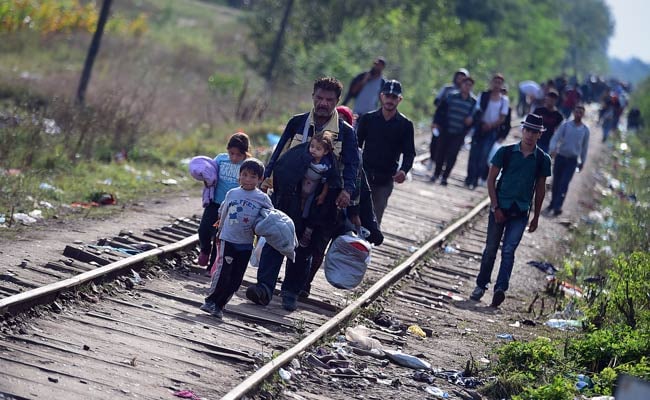
In a country where the idea of holding people in large facilities evokes memories of the Nazi era, the debate over "transit zones" is straining the coalition as it struggles to reassure a sceptical public it has a grip on migrant crisis.
Berlin:
Both Chancellor Angela Merkel's conservatives and their Social Democrat coalition partners back the idea of setting up centres to process asylum seekers, but can't agree on where to put them or even what to call them.
In a country where the idea of holding people in large facilities evokes memories of the Nazi era, the debate over "transit zones" is straining the coalition as it struggles to reassure a sceptical public it has a grip on the migrant crisis.
Ms Merkel's Christian Democrats (CDU) and their Bavaria-based Christian Social Union (CSU) sister party - together known as The Union - agreed at the weekend to set up transit zones on the border with Austria, where migrants deemed to have no solid claim to asylum will be denied entry.
That plan was rejected by the left-leaning Social Democrats (SPD), who have proposed "arrival centres" inside Germany, rather than on the border, to process asylum applications. The SPD has until Thursday to decide whether it backs the CDU/CSU plan.
"Enough of this needless naming argument!" mass-selling Bild daily wrote on Tuesday, pressing for a deal on the centres.
"We have a responsibility to reach a compromise," said Peter Altmaier, Merkel's chief of staff, who was last month appointed to oversee the government's handling of the crisis.
"We could set up the transit zones in a way that makes them effective without conveying detention," he told German radio, giving no details about what a compromise would look like.
Pressure from Bavaria
Both the conservatives and SPD are eager to show voters they are acting to stem the flow of new arrivals, who are expected to total up to 1 million this year. All three parties have lost support in opinion polls over their handling of the crisis.
Ms Merkel's CDU agreed to the transit zones plan after weeks of pressure from CSU leader Horst Seehofer, whose southern state of Bavaria has borne the brunt of the influx, as virtually all migrants arrive there from Austria.
Some 51 per cent of respondents in a poll last month said they were scared about the rising number of asylum seekers.
CDU lawmaker Michael Grosse-Broemer urged SPD leaders to tone down their verbal attacks on the proposed transit zones, adding that comparing them to Guantanamo Bay was not helpful. He said parties were caught up in a "logomachy" - a war of words.
"I think it's relatively absurd that we are arguing about a problem that affects 2.4 percent of the refugees who are coming to Germany," Gabriel said, referring to migrants from the West Balkans considered unlikely to be granted asylum because their countries are deemed safe.
He also seemed to suggest a compromise was possible.
"We may argue about 2.4 per cent of the problem, that's also okay, it won't be the end of the world ... Sometimes not everything is as dramatic as it seems."
In a country where the idea of holding people in large facilities evokes memories of the Nazi era, the debate over "transit zones" is straining the coalition as it struggles to reassure a sceptical public it has a grip on the migrant crisis.
Ms Merkel's Christian Democrats (CDU) and their Bavaria-based Christian Social Union (CSU) sister party - together known as The Union - agreed at the weekend to set up transit zones on the border with Austria, where migrants deemed to have no solid claim to asylum will be denied entry.
That plan was rejected by the left-leaning Social Democrats (SPD), who have proposed "arrival centres" inside Germany, rather than on the border, to process asylum applications. The SPD has until Thursday to decide whether it backs the CDU/CSU plan.
"Enough of this needless naming argument!" mass-selling Bild daily wrote on Tuesday, pressing for a deal on the centres.
"We have a responsibility to reach a compromise," said Peter Altmaier, Merkel's chief of staff, who was last month appointed to oversee the government's handling of the crisis.
"We could set up the transit zones in a way that makes them effective without conveying detention," he told German radio, giving no details about what a compromise would look like.
Pressure from Bavaria
Both the conservatives and SPD are eager to show voters they are acting to stem the flow of new arrivals, who are expected to total up to 1 million this year. All three parties have lost support in opinion polls over their handling of the crisis.
Ms Merkel's CDU agreed to the transit zones plan after weeks of pressure from CSU leader Horst Seehofer, whose southern state of Bavaria has borne the brunt of the influx, as virtually all migrants arrive there from Austria.
Some 51 per cent of respondents in a poll last month said they were scared about the rising number of asylum seekers.
CDU lawmaker Michael Grosse-Broemer urged SPD leaders to tone down their verbal attacks on the proposed transit zones, adding that comparing them to Guantanamo Bay was not helpful. He said parties were caught up in a "logomachy" - a war of words.
"I think it's relatively absurd that we are arguing about a problem that affects 2.4 percent of the refugees who are coming to Germany," Gabriel said, referring to migrants from the West Balkans considered unlikely to be granted asylum because their countries are deemed safe.
He also seemed to suggest a compromise was possible.
"We may argue about 2.4 per cent of the problem, that's also okay, it won't be the end of the world ... Sometimes not everything is as dramatic as it seems."
© Thomson Reuters 2015
Track Latest News Live on NDTV.com and get news updates from India and around the world

